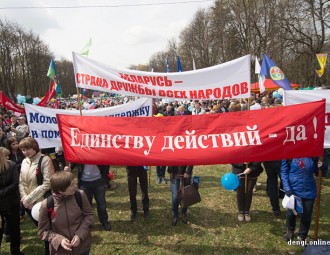Uladzimir Matskevich: Desovietization in Belarus is like the aging process – it decays and falls
 dengi.onliner.by
dengi.onliner.by
Ideological attempts to change people’s mentality using artificial "holidays" are doomed to failure.
Belarus has started a series of public holidays in May: May 1, May 9. Generally, the country lives in accordance with the Soviet red-day calendar. Over 25 years of independent Belarus only Radunitsa and Dziady were added to this calendar, whereas all other public holidays came from the Soviet era.
Why do the authorities hold on to the old Soviet legacy so much? How can we say goodbye to the Soviet past? What will replace it?
Philosopher and methodologist Uladzimir Matskevich answered the questions of the "EuroBelarus” Information Service.
- Why does Belarus live in accordance with the Soviet red-day calendar for 25 years of its independence already?
- Because Belarus ignores social sciences and humanitarian technologies.
In the early 90s, no one seriously thought about such things as semiotic environment, ideological crisis, and the need for mass cultural work. It resulted in equalization of the Christian Orthodox and Catholic dates of Christian holidays: we started celebrating two Christmases, two Easters, both Dziady and Radunitsa and preserved all Soviet holidays.
- The fall of Lenin statues in Ukraine demonstrated that the desovietization of Belarus has been long overdue on Belarus. What should we do with the Soviet holidays that have deep roots in our consciousness: should we make them unofficial and replace by Belarusian ones? Why do men, for example, celebrate the 23rd of February, instead of September 8?
- Actually, the idea to link men’s day with a military holiday is unreasoned. Family, or gender holidays are present in different cultures and among different peoples; there are mother’s days, father’s days, children’s days – we should consider holidays and their purpose in complex. These holidays are needed to strengthen and create awareness of the whole formation of human relationships – not social, not political, not associated with patriotism or nationalism, but human relations, as it happened with a number of religious festivals dedicated to a certain saint responsible for these or other features and sphere of human relations.
But our country hasn’t done it at all. In Belarus, there have never been a planned desovietization; it takes place, but only as a natural aging process – in decaying and destruction. This process can only be compared with the reconstruction of a building or architectural construction: however, it is possible to explore the building, identify what can be saved; at the same time, we can wait till the building is destroyed by itself in order to replace it with something new. In Belarus, the decision was made to do nothing about virtually all social phenomena and social norms but wait until they are rotten, destroyed, and degrade by themselves.
If we take May 1, in Soviet times this holiday used to be one of the central and the most admired, whereas now it has just died! It is for several years now that this mass holiday takes place as a mere day-off.
It’s not the result of a conscious cultural policy or a deliberate change of semiotic medium of people’s life in Belarus, but negligence.
- Soviet holidays, Soviet names of cities, villages and streets, and monuments to Lenin are everywhere. When will Soviet legacy finally leave after the Soviet Union? Or will this legacy only disappear with its last representatives?
- Soviet legacy is gradually disappearing. If we take holidays, of all the Soviet holidays only those have “survived” in which the official Belarusian ideology takes interest: July 3 (Independence Day) and May 9 (Victory Day). These two holidays are supported by the official ideology, but if this support stops they will soon lose their popularity and will be celebrated by very narrow social groups.
However, the question should concern the future: what will we have instead?
Holidays can’t be created artificially, or, at least, it’s not so easy. There are deep-laid archetypal principles of establishing large nationwide holidays. All main and most favorite holidays among all peoples are mostly connected with the days of summer and winter solstice, vernal and autumnal equinox.
A lot of Independence Days in different countries are close to the 22-23 June (summer solstice), i.e. they coincide with Kupala night. This is a common principle of connecting holidays with nature for holidays to become popular and nationwide.
Of course, each nation should have their own independence day; the one which is not invented, not artificially created, but the one that is tied to historical events. However rewritten or distorted the history is, it is the most important foundation for real holidays that outlive any political upheaval and social unrest.
“Family” holidays that concern the deep-laid side of life – human relations – are also very important. For example, apart from its religious meaning Easter is also a holiday that promotes strengthening of friendly, family, and human relations.
- Both Belarusian history and Belarusian folk traditions are rich enough to find a replacement for Soviet holiday heritage, aren’t they?
- Of course! It is no wonder that these holidays have outlived all the prohibitions and persecutions. For all the antireligious nature of the Soviet Union Easter has always been celebrated in Belarus – always, even in the most stagnant times.
Radunitsa, Dziady, and Koliada - all holidays, formed in ancient times, filled with Christian meaning, but rooted in paganism, have stayed, survived all political upheavals, changes of borders, regimes, and states on the territory of Belarus. And will stay.
If a holiday has is deeply rooted it means it is very enduring, and ideological attempts to change the mentality of the people with the help of artificial inventions are initially doomed to failure.
-
03.01
-
07.10
-
22.09
-
17.08
-
12.08
-
30.09



























